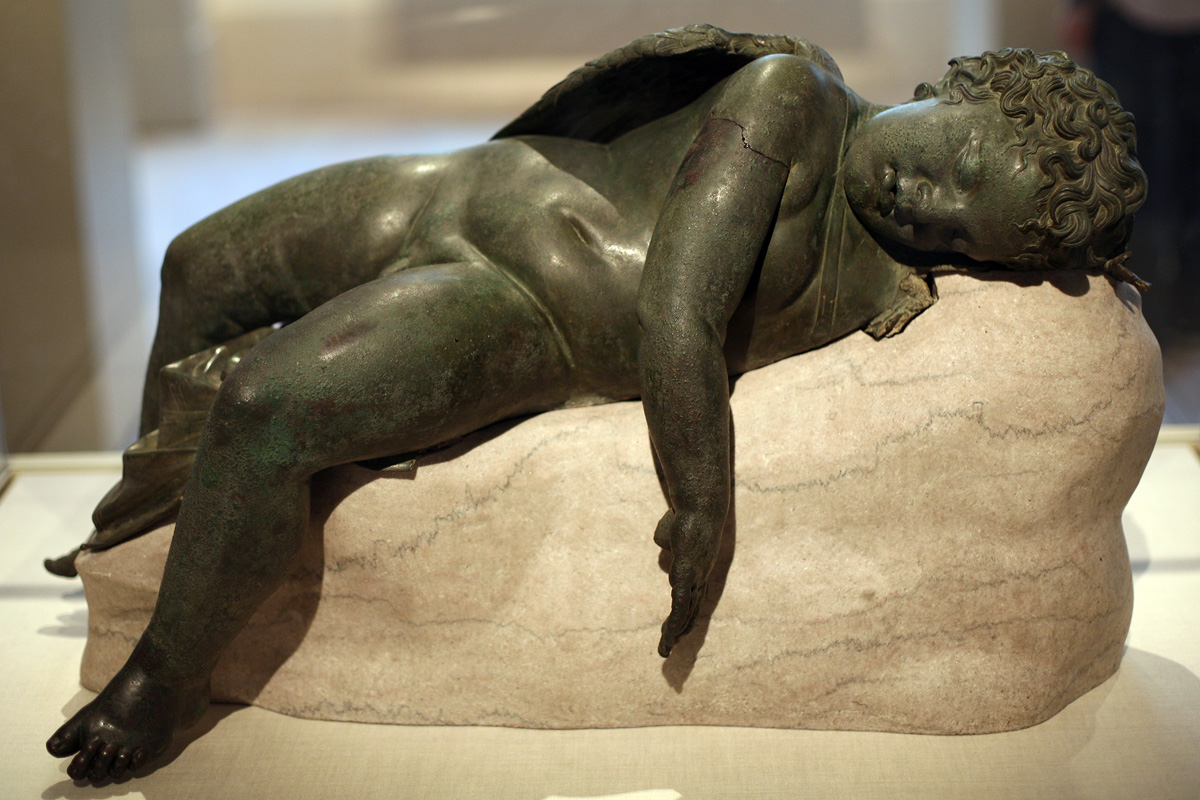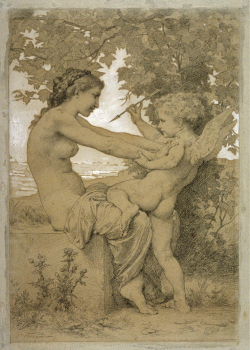
A bronze statue from around the second century BCE now housed in the Metropolitan Museum of Art shows Eros sleeping//Photo: shooting brooklyn, flickr
Lessons on love from ancient Greeks and Taylor Swift
Ancient Greek stories tell of a force we cannot eradicate. A god to some, demon to others, Eros’s myth reminds us on Valentine’s Day why people cannot help who and how they love.
Obviously, being ancient, it’s not a new idea. But it’s one that is forgotten at our peril, UM classics professor Mark Joyal says.
“The Greeks had great respect for human nature and their stories have lessons,” he says. “We’ve deluded ourselves into thinking that we can change human nature, but human nature is unchangeable. Ancient Greeks realized this, and that’s one of the reasons why they had no difficulty in characterizing all sorts of forces in this world as gods or goddesses, because they recognized these forces are immortal, we can’t change them, and they have power over us.”

“Loves Resistance” by William-Adolphe Bouguereau, 1885.
Pop star Taylor Swift captures Eros’s bewitchery and irrationality in lyrics like, “Isn’t it just so pretty to think / All along there was some / Invisible string / Tying you to me?” and “This love is good / This love is bad.” The 18th century German poet Johann Wolfgang von Goethe caught the selflessness of it with the quip, “If I love you, what business is that of yours?”
Deep down we know about it, but if we do forget or overlook Eros, it may be because we know his Roman version better: Cupid. Both Cupid and Eros were unbearably beautiful archers with magical arrows but, Joyal notes, the Roman version morphed into a cultural conceit and over time lost its everyday power. Yet the Greeks stories told it differently.
“The stories aren’t exactly warnings because a warning implies you should resist,” Joyal says. “Stories about Eros are not a warning but a heads up…. You can use reason to overcome it, but you’ll probably be unsuccessful because it’s a god after all and you’re not. Eros will overtake you and it may make you do things at odds with your long-term interests, but in the moment, it is a very attractive thing.”
Plato, an ancient Greek philosopher, makes Eros something different in his dialogue Symposium. (“But you have to remember that most Greeks thought of Eros as a god and at the time didn’t read or know who Plato was,” Joyal says). Here Plato uses Eros to make a philosophical point by framing Eros as an intermediary that can connect us to the gods and ideals and our better selves, even calling Eros a daimon (root of our “demon”), something that can attend to someone from birth. It was an incredibly influential idea, laying the runway for ideas like guardian angles to later land. Plato also tied Eros to same-sex relationships, which is why Eros and Cupid are sometimes treated as gods of homosexuality, but Joyal says Plato was just trying to relate to his audience, which was leisure class males who liked spending time among younger males.
“At the root of it, the Greeks saw Eros as an irrational impulse that brings two things together. It could be two people, two animals, two insects. It’s a force we cannot reason away,” Joyal says. “It’s why sex sells. People might tear their hair out and wish it weren’t so, but it’s so.”






